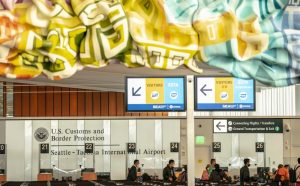
Navigating the complexities of international travel to the United States can often raise many questions, especially regarding Customs and Border Protection (CBP). This article aims to clarify what CBP is and how it relates to your US visa.
What is Customs and Border Protection (CBP)?
Customs and Border Protection (CBP) is a vital agency within the Department of Homeland Security (DHS) responsible for safeguarding America’s borders while facilitating legitimate trade and travel. CBP’s mission is to enforce U.S. immigration laws, customs regulations, and agricultural regulations to protect both citizens and visitors.
CBP plays a crucial role at various entry points, including airports, seaports, and land borders. Their personnel are responsible for inspecting travelers and their belongings, ensuring compliance with U.S. laws, and preventing the entry of illegal goods and individuals.
For travelers entering the U.S. on a visa, understanding the role of CBP is essential. Upon arrival, you will encounter CBP officers who will review your travel documents, including your visa, and may ask questions regarding your stay in the U.S. It is crucial to provide honest and accurate information to these officers to ensure a smooth entry process.
For more detailed information, you can visit WHAT IS CUSTOMS AND BORDER PROTECTION FOR US VISA.
The Importance of CBP in the Visa Process
When applying for a US visa, you may not initially consider the role of CBP, but it significantly impacts your travel experience. The visa you hold grants you permission to seek entry into the U.S., but it is CBP that ultimately decides whether you are allowed to enter.
Here are a few key functions of CBP regarding US visas:
- Verification of Documentation: CBP officers verify your visa and other travel documents upon arrival. This includes checking the validity of your visa and ensuring it matches the purpose of your visit.
- Conducting Interviews: CBP may conduct brief interviews to ascertain the purpose of your visit. Being prepared to answer questions about your travel plans, accommodations, and duration of stay can help facilitate this process.
- Assessing Risk: CBP assesses any potential risks associated with travelers entering the U.S. This can include checking against databases for any previous violations or security concerns.
Understanding these functions can help you prepare better for your arrival in the U.S. and make the process smoother.
Renewal of US Visa
After you have successfully navigated the entry process, you may find yourself in need of renewing your US visa in the future. Visa renewal is an essential process for those who plan to extend their stay or return to the U.S. for subsequent visits.
The good news is that many individuals can renew their US visas online, streamlining the process significantly. However, certain eligibility requirements must be met. Generally, you may be eligible to renew your visa without an interview if you meet the following criteria:
- Your visa is still valid or expired within the last 48 months.
- You are applying for the same visa classification.
- Your visa was issued in your home country.
For detailed information about the renewal process, including the steps involved and potential exceptions, visit RENEW USA VISA.
Conclusion
Understanding Customs and Border Protection (CBP) and its role in the US visa process is crucial for anyone planning to travel to the United States. From ensuring your documents are in order to facilitating your entry into the country, CBP plays a vital role in maintaining the safety and security of U.S. borders.
Additionally, knowing how to renew your US visa can help you maintain your travel plans without disruption. By being informed about both CBP and the renewal process, you can ensure a more seamless travel experience. For more resources and detailed guidance, make sure to check the provided links.

